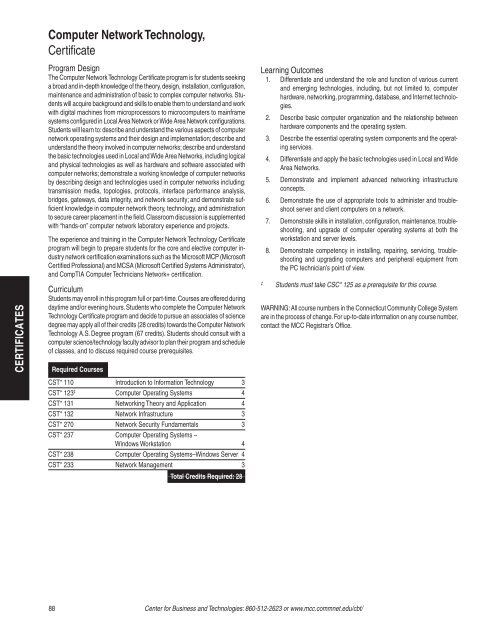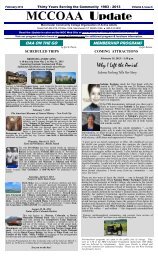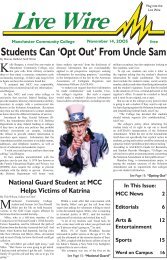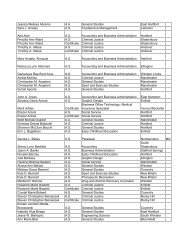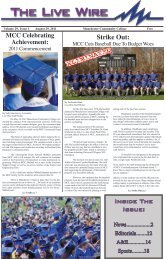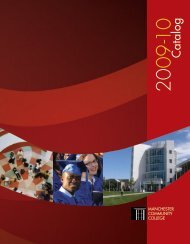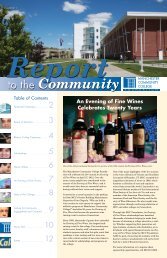Liberal Arts and Science - Manchester Community College ...
Liberal Arts and Science - Manchester Community College ...
Liberal Arts and Science - Manchester Community College ...
You also want an ePaper? Increase the reach of your titles
YUMPU automatically turns print PDFs into web optimized ePapers that Google loves.
CERTIFICATES<br />
Computer Network Technology,<br />
Certificate<br />
Program Design<br />
The Computer Network Technology Certificate program is for students seeking<br />
a broad <strong>and</strong> in-depth knowledge of the theory, design, installation, configuration,<br />
maintenance <strong>and</strong> administration of basic to complex computer networks. Students<br />
will acquire background <strong>and</strong> skills to enable them to underst<strong>and</strong> <strong>and</strong> work<br />
with digital machines from microprocessors to microcomputers to mainframe<br />
systems configured in Local Area Network or Wide Area Network configurations.<br />
Students will learn to: describe <strong>and</strong> underst<strong>and</strong> the various aspects of computer<br />
network operating systems <strong>and</strong> their design <strong>and</strong> implementation; describe <strong>and</strong><br />
underst<strong>and</strong> the theory involved in computer networks; describe <strong>and</strong> underst<strong>and</strong><br />
the basic technologies used in Local <strong>and</strong> Wide Area Networks, including logical<br />
<strong>and</strong> physical technologies as well as hardware <strong>and</strong> software associated with<br />
computer networks; demonstrate a working knowledge of computer networks<br />
by describing design <strong>and</strong> technologies used in computer networks including:<br />
transmission media, topologies, protocols, interface performance analysis,<br />
bridges, gateways, data integrity, <strong>and</strong> network security; <strong>and</strong> demonstrate sufficient<br />
knowledge in computer network theory, technology, <strong>and</strong> administration<br />
to secure career placement in the field. Classroom discussion is supplemented<br />
with “h<strong>and</strong>s-on” computer network laboratory experience <strong>and</strong> projects.<br />
The experience <strong>and</strong> training in the Computer Network Technology Certificate<br />
program will begin to prepare students for the core <strong>and</strong> elective computer industry<br />
network certification examinations such as the Microsoft MCP (Microsoft<br />
Certified Professional) <strong>and</strong> MCSA (Microsoft Certified Systems Administrator),<br />
<strong>and</strong> CompTIA Computer Technicians Network+ certification.<br />
Curriculum<br />
Students may enroll in this program full or part-time. Courses are offered during<br />
daytime <strong>and</strong>/or evening hours. Students who complete the Computer Network<br />
Technology Certificate program <strong>and</strong> decide to pursue an associates of science<br />
degree may apply all of their credits (28 credits) towards the Computer Network<br />
Technology A.S. Degree program (67 credits). Students should consult with a<br />
computer science/technology faculty advisor to plan their program <strong>and</strong> schedule<br />
of classes, <strong>and</strong> to discuss required course prerequisites.<br />
Required Courses<br />
CST* 110 Introduction to Information Technology 3<br />
CST* 123 ‡ Computer Operating Systems 4<br />
CST* 131 Networking Theory <strong>and</strong> Application 4<br />
CST* 132 Network Infrastructure 3<br />
CST* 270 Network Security Fundamentals 3<br />
CST* 237 Computer Operating Systems –<br />
Windows Workstation 4<br />
CST* 238 Computer Operating Systems–Windows Server 4<br />
CST* 233 Network Management 3<br />
88<br />
Total Credits Required: 28<br />
Learning Outcomes<br />
1. Differentiate <strong>and</strong> underst<strong>and</strong> the role <strong>and</strong> function of various current<br />
<strong>and</strong> emerging technologies, including, but not limited to, computer<br />
hardware, networking, programming, database, <strong>and</strong> Internet technologies.<br />
2. Describe basic computer organization <strong>and</strong> the relationship between<br />
hardware components <strong>and</strong> the operating system.<br />
3. Describe the essential operating system components <strong>and</strong> the operating<br />
services.<br />
4. Differentiate <strong>and</strong> apply the basic technologies used in Local <strong>and</strong> Wide<br />
Area Networks.<br />
5. Demonstrate <strong>and</strong> implement advanced networking infrastructure<br />
concepts.<br />
6. Demonstrate the use of appropriate tools to administer <strong>and</strong> troubleshoot<br />
server <strong>and</strong> client computers on a network.<br />
7. Demonstrate skills in installation, configuration, maintenance, troubleshooting,<br />
<strong>and</strong> upgrade of computer operating systems at both the<br />
workstation <strong>and</strong> server levels.<br />
8. Demonstrate competency in installing, repairing, servicing, troubleshooting<br />
<strong>and</strong> upgrading computers <strong>and</strong> peripheral equipment from<br />
the PC technician’s point of view.<br />
‡ Students must take CSC* 125 as a prerequisite for this course.<br />
WARNING: All course numbers in the Connecticut <strong>Community</strong> <strong>College</strong> System<br />
are in the process of change. For up-to-date information on any course number,<br />
contact the MCC Registrar’s Office.<br />
Center for Business <strong>and</strong> Technologies: 860-512-2623 or www.mcc.commnet.edu/cbt/


